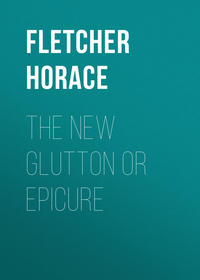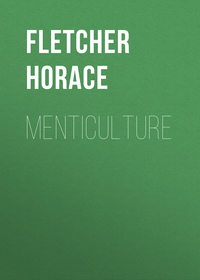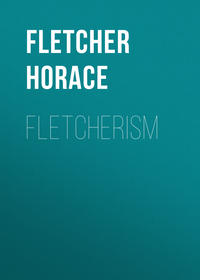 полная версия
полная версияHappiness as Found in Forethought Minus Fearthought
"Set 'em up again; they are all down but nine," said, in the spirit of hopeful determination, has won games for many contestants.
It is the point-of-view that determines whether an obstacle is a hurdle or an obstruction, or whether the obstruction, if it be such, is in the wrong road or not. If a traveler on life's road starts with an optimistic point-of-view he will enjoy obstacles as hurdles, or he will greet obstructions with pleasure, as being Providentially placed in the wrong road. In any case he will be happy about it, and his happiness will be the best possible stimulant in aiding him to clear hurdles or to seek new paths to pleasant places.
The optimistic and pessimistic points-of-view are the means by which the concordant and discordant notes in life are sounded. The merit or demerit of things lies less within the things themselves, as far as the observer is concerned, than in his ability to accept them complacently, if inevitable, and to mould or to shape them to profitable and agreeable uses, rather than to suffer them as unprofitable and disagreeable. For example, it is profitable to look upon all persons and upon all experiences as teachers, but to reserve the superiority of choosing to be guided by them or warned by them according as the quality of the teaching is good or bad.
There are proverbs in all languages that teach the preference of the optimistic point-of-view, but they will avail little as long as fearthought is tolerated as a necessary and respectable thing. Experience endorses the proverbs and discredits the necessity and respectability of fearthought.
The Japanese have a proverb, born of the optimistic point-of-view, that is very useful to them, inasmuch as the light wood-construction of their houses invites frequent fires and sweeping losses in consequence. After a fire it is fashionable in Japan for sufferers to greet each other in sympathy with the truism, always accompanied by a smile, "Not much trouble to move," and then they all pitch in to assist as much as possible to rehabilitate each other through kind attentions that really make the fires but hot-bed nurseries of altruistic sympathy, in which there is more joy than in the greatest accumulation of possessions.
After the war – the recent sectional dispute, whose theater of destruction was in the Southern States of America – many of the families of the ante-bellum slave aristocracy were mainly reduced in possessions, and deprived of some of the means of ostentation, and in rare instances, of the necessary means of comfort; but they had been defeated in their Cause, and many of them settled into a state of depression that was more cruel to them than all the reverses of the war. Nature continued to be as kind, the seasons smiled on the crops with unvarying regularity, and the physical scars of war were soon healed and overgrown, but the disappointed ones heeded not the return of material prosperity. They focused their point-of-view upon the past, and refused to see the smiles and the warmth of the present and the promise of the future.
Property aristocracy always creates a false pride, in which the point-of-view is distorted.
It will undoubtedly be the same with the name-proud Greeks as it was with the property-proud Southrons, and bespeaks little for the respectability of a pride that afflicts its victims more seriously than the destruction of property.
It is a meritorious pride that rises superior to defeat, and after saying "Thy Will Be Done" adds, "Teach Thou Me Appreciation," and begins the pursuit of peace anew with the point of view directed by optimism and not by pessimism.
I have seen whole families, suffering from self-imposed humiliation and depression, leap into new life, new growth, and new happiness at a change of the point-of-view. The Southerners are, above all other Americans, chivalrous and loyally American in their natures. They are also generally religious, and cling to the teachings of their parents. In focusing their point-of-view upon the past, and, nursing the sting of defeat, they have thought that they were conserving filial regard, chivalry and religion, and they have held to the distorted point-of-view with loyal purpose. A change of the point-of-view, rising superior to disappointment, more nearly satisfied filial pride, while Christian optimism and gratitude more nearly became the profession of religion than the fault-finding dictated by the antiquated point-of-view. Finding fault with the happenings of the past is as much blasphemy as any other disapproval of the Almighty, and yet blasphemy is regarded as the wickedest of sins in religious estimation; and, at the same time, loading up with a burden of depression and self-humiliation is the most unprofitable form of self-abuse known to economics.
It is better to have an intelligent and optimistic command of the point-of-view and hold title to nothing, than to have possessions valued at millions, and not count this as the richest possession of them all. If anything seem to be wrong with you, first examine the point-of-view. If you do this conscientiously, you will probably find the fault therein and seek a remedy by changing the point-of-view.
DON'T BE A SEWER
A sewer is a channel for the conveyance of disagreeable matter.
Any person who receives and carries mean report or suspicion of his neighbor is therefore a human sewer.
A good sewer is a good thing. It receives disagreeable matter and carries it along, hidden from sight and away from the other senses, to some remote place, and discharges it there.
A leaky sewer is an abomination.
Human sewers usually leak. They take delight in letting out the disagreeable matter they are carrying, at every street corner, in every parlor, and in the midst of the multitude, wherever they may chance to be. The characteristic of the human sewer is that it is a leaky sewer. By its leaks it is known.
Human sewers themselves generally create much of their sewage.
I once had a friend, an otherwise good fellow, who had acquired the habit of collecting and distributing social sewage. He was not amenable to logical suggestion against the habit. He held the idea that a spade should be called a spade, and that if disagreeable things existed, honesty required that they should be discussed. One day, when my friend was carrying an unusually heavy load of sewage, and was distributing it freely, this thought came into my mind, and I gave it utterance. "You remind me of a sewer," said I.
There might have been a serious impairment of our friendship as the result of my utterance, for my friend is full of so-called "spirit," had I not immediately followed my offensive remark by an apology, and a brotherly explanation somewhat in the vein as above.
The good effect of the comparison on my friend is my excuse for introducing it here. What logic and persuasion had not been able to accomplish, offensive comparison accomplished.
My friend is too self-respecting to allow himself to be in any way related to a leaky sewer, and has reformed beautifully. A short time since, in speaking of the incident, he acknowledged its effectiveness by saying, "Every time I think of anything mean I fancy I can smell it."
CALL SUSPICION A LIAR
It is an excellent rule to follow to call Suspicion a liar five times before basing judgment upon its testimony.
If you will take the trouble to investigate the average accuracy of your suspicions, you will note that they are wrong in so many cases that they are not a safe guide, and are generally unjust accusers.
While the person who harbors the suspicion is the worst sufferer in the end, when the accusations have been proved to be groundless, there is always a possibility of injustice, that, falling on servants or others holding inferior positions, is exceedingly cruel.
How often, in the household or in the hotel apartment, is a carelessly mislaid ring the cause of great unhappiness to both mistress and maid, because of the ready mischief of Fearthought and its attendant imp, Suspicion.
It is an axiom of the detective service, that untrained suspicion generally takes the wrong scent, and that it usually saves time to look in some other direction for the culprit, than in that pointed out by the accuser.
The elimination of the seeds of Fearthought from the mind, the possibility of which is the contention of my theory, will carry with it suspicion, and relieve one of endless chance of doing and suffering injustice, but if emancipation should, unfortunately, not have been accomplished, it is an excellent rule to follow, to meet Suspicion with suspicion, and call it "liar"! five times, before making accusation on its testimony.
I CAN'T NOT DO IT
A person more frequently lies when he says "I can't" than when he says "I can." There are, to be sure, more things that one cannot do than there are that he can do, because the ability of the strongest and most skillful is comparatively limited; but the person who is in the habit of saying "I can't" usually says it about the wrong thing or at the wrong time.
Whenever a person says that he cannot do a thing that God has made it possible for him to do, and which he knows to be possible, he is not only a liar, but also a blasphemer.
If one is asked to climb a tree or lift a very heavy weight, there may be reason for saying "I can't," because of lack of ability, strength or practice. For the same reason, difficult "runs" on a piano, perilous feats of balancing or turning in gymnastics, and even a great many simple things that are easy to the accustomed, may be impossible to the unaccustomed without certain practice, and with reference to them it is reasonable to say, "I can't."
If, however, one is asked not to climb a tree, or not to lift a weight, or not to perform a "run" on a piano, there is no excuse for saying, "I cannot not do it," for it is as illogical as it is ungrammatical, and as false as any other lie.
Applied to mental accomplishment, it is even more illogical and false, because thought is more pliable than muscle.
Not being evil is simply not being evil, and whoever says, "I cannot not be bad," is a liar. When he is asleep he proves the lie.
There are habits-of-desire which seem attractive to perverted taste, that may need a strong counter-suggestion to correct, but there is no habit-of-desire but what can easily be corrected by the right counter-suggestion. For instance, drinking whisky habitually is recognized to be a bad habit of perverted desire, but one habitual drunkard I know of abjured whisky for life on account of having discovered a dead fly in his glass.
Sometimes it requires a mania to cure a mania. Dr. H. Holbrook Curtis, the eminent throat-specialist of New York, who has in his care, during grand opera season, millions of dollars' worth of voices, and who makes special study of the mental condition of his patients, once said to me, "The only cure that I know of for dipsomania is religio-mania." This same assertion is frequently made in quite a different way, but to the same effect. Dr. Curtis did not mean by religio-mania religious appreciation; neither did he mean by dipsomania, temperate use of stimulants. He referred to the intemperate emotion and the morbid taste. The practice of drinking unduly because of the social temptation of it may be cured by logical suggestion, but a mania may be amenable only to a mania. There is, however, no bad habit but that can be corrected by some means, and as there is some remedy for every separate phase of evil, it should be considered not respectable to say, "I cannot not do"; and, as measure of respectability is the highest social desideratum in the present age, the best weapon to be used against the toleration of evil in one's self or in others is a general protest against it on the score of its being unnecessary and not-respectable.
In my experiments I have used all sorts of means of suggestion with which to reach perverse habits of evil thought. As stated elsewhere, offensive comparisons and ridicule are more frequently effective than reason or logic, and, as such, are often necessary, in the same way that offensive medicines are sometimes effective in removing indigestible matter from the stomach, – for example, ipecac.
I had a friend who was in the habit of saying "I can't" to almost everything. The habit-of-opposition was so strong that it was the first to assert itself on every occasion. The attitude of opposition was strengthened by the perverse idea that brutal frankness is an expression of honesty, and hence reference to his honesty or dishonesty was a tender point of etiquette with my friend. To touch this tender spot, and administer the strong suggestion – medicine – necessary in the case, I hit upon this expedient:
Whenever my friend said "I can't" to a proposition which it did not fit, I immediately ejaculated "Liar!" At first there was some danger attending my experiment, but I took the precaution to be out of reach, and the fact that my intention was good assured me ultimate pardon.
At first my offensive criticism was frequently necessary, but it became less and less so, till at last the cure is so complete that the once favorite expression, "I can't," is as disagreeable to my friend, as must have been the dead fly in the glass of the drunkard previously mentioned, that was the means of curing him of a deeply rooted habit.
A MILLION TO ONE ON THE UNEXPECTED
One evening, at a meeting of the "Ganglionics," in the city of New Orleans, I asked the president of the club, Dr. William Benjamin Smith, the question, "Why is it that the unexpected generally happens?" His reply, which induced the caption to this chapter, was, "Because the expected is only one thing, while the unexpected may be a million things."
This is really, as well as figuratively, true, and, being true, what idiots are we to waste our time and paralyze our energies, by thinking fearthought into the future, on a million-to-one chance of its hitting the mark.
There is one bull's-eye that we are sure to hit if we aim at it constantly and long enough. Death is the one universal bull's-eye that figures in every life. At the same time that we are sure of hitting it, we know by the experience of others that we do not realize death when it actually comes, for Nature kindly administers an anæsthetic just before death, and sometimes long before. Then why should we fear even death?
Persons who have been at the open door of the unexplored state called death say that a delightful feeling of rest comes over the emigrant, and that entry into the next state is like being in a beautiful dream.
If this be so, there is also nothing disagreeable in death – only in the fearthought about it – and hence the one only bull's-eye we have been sure of hitting – the cause of fear of death – does not exist, except in our hopes or our fears.
Many persons who are in the habit of apprehending cause for fearthought about the future, and who spend much of their time in worry, would not like to be put down in the category of false prophets, and yet their apprehension must be false in the ratio of chances of a million to one.
Thought about chance, as related to forethought, and from the point-of-view of the speculator or gambler, suggests the absurdity of wasting any good coin – calm and happiness – by "laying it on" – betting on – fear. The chances against having "coppered" the right fear are not only not even, but are ten to one against – an hundred to one against – or more – never less. Even if you should win by correctly guessing a fear, you would get back again none of the happiness that you had sacrificed – would not even get your "stake" back.
As a matter of actual experience, the following incident is a good example: A young man employed in a publishing house, where the proprietor was afflicted with the fuss-and-fret-habit, contracted the disease, and unconsciously became a victim to its toils. Robust good health began to give way to languor that induced dyspepsia and other contingent disorders, until suicide stared the young man in the face and haunted his dreams.
One day some one whispered a suspicion in the young employee's ear that was directed at worry and anger as the causes of his ill-health and unhappiness and the thought led his systematic habits-of-business to suggest "keeping tab" on at least one of the suspects, to see if it were the liar and thief, as charged. Each day, when worry made its predictions, record of them was carefully kept, and at the end of the month the reports were checked up by results. Only three per cent. of the predictions were even remotely realized!
The old proprietor of the business, through whom the contagious poison started, is dead, and the happy young menticulturist owns the business, which has become very successful by influence of the sunny optimism of its new owner, which attracts trade unconsciously to it.
LOVE CANNOT BE QUALIFIED
The merit of loving is in the act, and should not – cannot – be qualified by the merit or demerit of the object under consideration.
There may be more effort required, perhaps, in loving something that seems to us unlovely, but no more virtue in so doing, as loving, like virtue, is its own reward.
God-love does not discriminate. It is, therefore, ungodly to discriminate. In the performance of the Man-Nature partnership-function of "divine selection" in the harmonizing of things that are antagonistic to each other and to Man – selecting for survival those things that are not deterrent to the harmonious growth and happiness of Man – if selection is to be made, it should be done in the spirit of calm justice, and not in the spirit of hate, for, as love blesses the lover, so does hate react upon the hater.
We cannot afford not to love.
There are animals and insects that seem to us to be undesirable and prejudicial to the harmony we are seeking to secure, that may serve most excellent purposes in relation to existing conditions. They are frequently a warning against unfavorable conditions, in the same way that pain is a warning against diseased conditions in the body. In the same way, crime is a warning against social or political conditions which invite or compel crime, and remedy should be sought in change of the conditions in preference to the punishment of the crime. I believe that a change of our point-of-view – our attitude towards causes and effects – would find punishment generally unnecessary, and, as such, brutal.
There is, then, a double reason why we should hate nothing. In the first place, it is probable that we are hating the wrong thing, and thereby are unjust, and we are certainly doing injury to ourselves by nursing the feeling of hatred.
Disapproval – calm disapproval – is a better judge in the exercise of "divine selection" than angry antagonism. Pity, as well as love, is a divine attribute, but hate is an attribute of the devil. Pity suggests change of conditions producing inharmonious results. Hate suggests punishment of the victim of the inharmony.
In its relation to personal comfort, the practice of not permitting hate, nor annoyance, nor irritation, nor repulsion to possess one's feelings, will bring greatest good results. Take the mosquito pest, for instance: One who begins to feel irritation at the sound made by the wings of the insect, is already creating within himself a condition favorable to inflammation from the effects of the bite. Many who suffer by mosquitos admit that the buzz is worse, to them, than the bite, which is proof of a purely mental and unnecessary affliction.
There was a time in my boyhood when mosquitos poisoned and annoyed me beyond endurance. Each bite represented a great itching welt, and the buzzing was full of terror in consequence, or, more likely, in the light of present knowledge, the buzzing inspired fearthought or dread, and the bite was very poisonous in consequence. At present, mosquito bites are not poisonous to me, and mosquito sounds are no longer disagreeable. I do not remember when the deliverance came. Possibly the cure came through intimate acquaintance. I have lived in localities where the mosquito thrives all the year round, and in such numbers that he tires his victims into a state of non-resistance, and in the calm of non-resistance, physical and mental irritations cease. This is sometimes called acclimatization, but it proves the contention, whichever way it is interpreted.
In the practice of my freedom from what was once a great affliction, I sometimes brave a swarm of mosquitos by sleeping in their presence without drawing the bar. If the mosquitos light on me freely, I find comfort in the evidence of my popularity, and in the fact that I am probably being of service to something, or somebody, by possibly diverting attentions that would not be appreciated in like manner by them. In the morning, when I look in the glass and note the little red spots that the bites have left, but of which I am not otherwise conscious, I consider them as a record of my hospitality, and am proud of them, as the German corps student is proud of the scars on his face, that are a record of equally foolish bravery or exposure, taken out of his university course at Heidelberg or elsewhere. My braving of the mosquitos would certainly be classed as foolish, except as a test of superiority, but the pin-point red spots soon disappear and do no permanent harm.
Mosquitos are said to breed in malarial conditions, and for the purpose of absorbing the malaria. Flies do not exist except in conditions of ferment, and are of greatest service in carrying it away. Roaches are splendid scavengers, and are a result, and not a cause, of unclean conditions. Our warfare should be waged against unclean and inharmonious conditions, and not against the purifiers and harmonizers of the conditions.
It is not a difficult matter to rid one's self of repulsions if the point-of-view is changed. I presume that the most generally detested creature that is not altogether deadly in its venom is the bedbug. The bedbug is more of a tradition than a fact, and many of those who shudder at mention of him have never seen one of his kind. I am sure that none of his enemies have much if, any, acquaintance with him, as to the color of his eyes, his habits of thrift, his amiability in his family and other qualities that serve to make a creature attractive and respectable within his sphere.
The truth about this much despised creature is that he is useful as a warning against unclean conditions, and his odor and his bite are his notes of warning. Instead of filling one's self with a feeling of repulsion or anger or any other emotion that affects the free circulation of the blood, and relaxes and disorders the tissues of the body, at sight or mention of a bedbug, the discovery should elicit the expression, "Thank you for the information." If it should happen in one's own house, no hidden crack nor corner should escape an overhauling to get rid of the cause of the bedbug's warning; or, if it should happen in a hotel, there should be a change of hotel.
Mention is made of mosquitos and roaches and bedbugs in this connection, not for the purpose of degrading the feeling of love by applying it to things that are disagreeable, no matter what their mission of usefulness, but to put stress upon the fact that one cannot afford to hate anything. It is especially useful, in seeking to change the point-of-view, to consider the greatest of causes of repulsion in order to more easily reach the lesser causes, for the lesser fade of themselves by the removal of the greater.
If you can learn not to hate a bedbug, to thank a roach for informing you of unclean conditions and to endure mosquitos, you are pretty sure to modify all prejudices by thus doing.
LAST SOMETIMES FIRST
It is my own habit to read the last chapter of a book first and if the summary of its contentions and deductions, which are sure to be found in the closing chapter, interest me, I go carefully through the book with the author to learn how he has reached his conclusions. I find, upon enquiry, that many others do the same. This is made necessary because of the vast number of books that are published and the impossibility of learning by other than the easiest means more than a small proportion of the ideas that are given out each year. There are published, yearly, in English, twenty to thirty thousand volumes of new matter, or new arrangements or new editions of old matter, so that to read carefully only a catalogue of them would be a considerable task for the ordinary reader.







